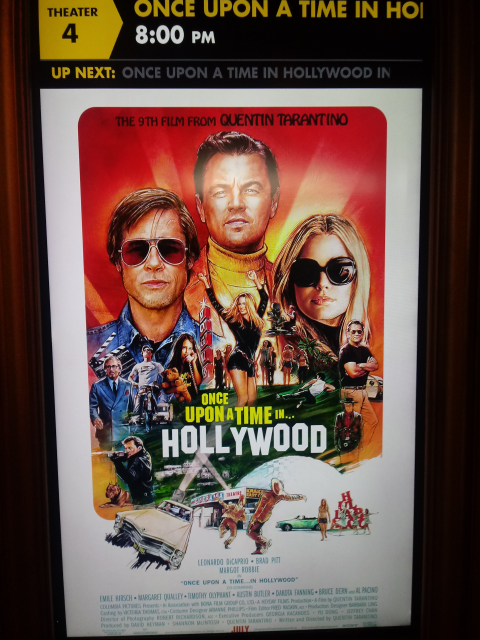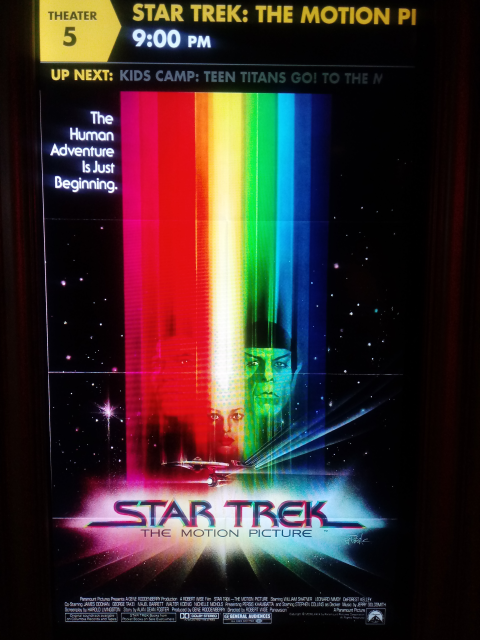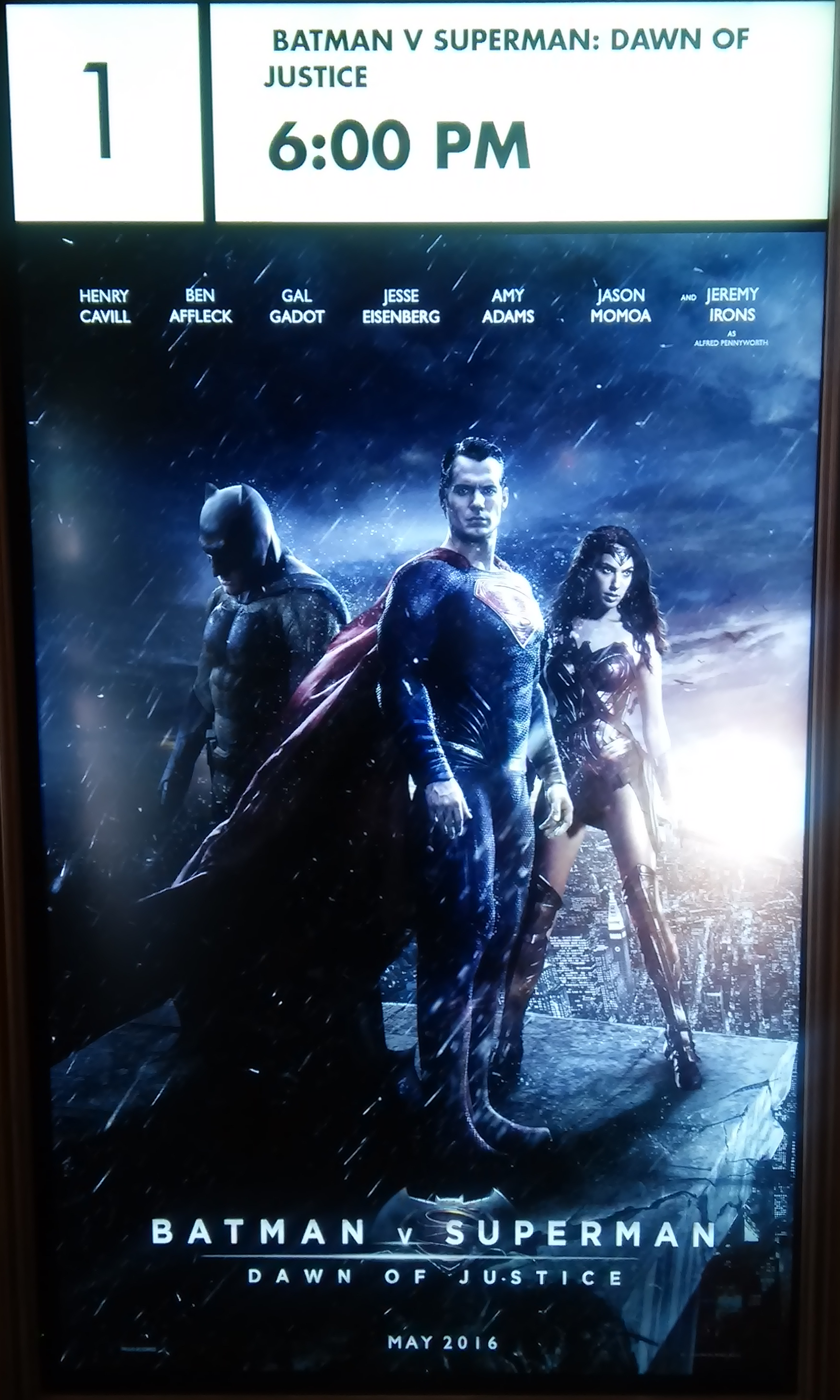These two movies don’t have anything intrinsically in common (other than friendship being at the core), but with all the talk about Tarantino’s next (and last) film quite possibly being an R-rated Star Trek movie, I figured why not pair these up.

Written and Directed by Quentin Tarantino
Cast: Leonardo DiCaprio, Brad Pitt, Margot Robbie, Emile Hirsch, Margaret Qualley, Timothy Olyphant, Julia Butters, Austin Butler, Dakota Fanning, Bruce Dern, Mike Moh, Luke Perry, Damian Lewis, Al Pacino, Brenda Vaccaro, Kurt Russell, Zoë Bell, Lorenza Izzo, Rebecca Gayheart, Michael Madsen, Martin Kove, James Remar, Clifton Collins Jr., Scoot McNairy, Marco Rodriguez, Keith Jefferson, Eddie Perez, Maurice Compte, Lew Temple, Samantha Robinson, Daniella Pick, Spencer Garrett, Damon Herriman, Lena Dunham, Rafał Zawierucha, Nicholas Hammond, Costa Ronin, Rumer Willis, Dreama Walker, Rachel Redleaf, Rebecca Rittenhouse, Ramón Franco, Clu Gulager, Kate Berlant
When I first heard that Quentin Tarantino’s new film would be dealing with, you know, that whole Charles Manson and his crazy killer hippie family thing, I was a bit disappointed, as it’s a subject matter well-worn in media portrayal, and, despite Tarantino’s talent, I was hoping for some ground far less traveled.
Silly me, I should have expected the unexpected from the very beginning, though I did go into the film fairly wide-eyed as I couldn’t glean much from the marketing as to what the movie would truly be.
I won’t do a deep dive into Tarantino’s career here (I’ve already done it over here), but I’m not sure it’s really necessary anyway, as Once Upon a Time … in Hollywood is the most uniquely different film he’s ever made; even more a radical departure than Jackie Brown. For one, it’s, well, I’ll call it a comedic fairy tale. Yes, it takes place in the reel world of 1969, and yes, there are scenes of drama and tension, but on balance, Hollywood is a comedy, and a rather wistful one at that (as wistful as Tarantino can manage, anyway).
At the core though is the friendship between shy, stammering actor Rick Dalton (Leonardo DiCaprio) and his cocksure stuntman, Cliff Booth (Brad Pitt), who are wonderful both together and separately. And of course I’d be remiss if I didn’t mention Margot Robbie, who may not be Sharon Tate, but puts in an admirable portrayal nonetheless.
Really though, what I loved most was the reveling in the world of the film, and the amazing attention to detail in production design, costuming, sets, props, music, television, etc; and the way it blends the fictional with the factual is just fantastic (and since you don’t have anyone playing themselves, you don’t run into a situation like Robert Altman’s The Player, where you have to keep track of who’s a character and who isn’t).
It’s not a perfect comparison, but I got some American Graffiti vibes from this film, in the sense that it’s a tribute to a particular time and place, and it’s mostly a hangout movie that jumps around between a few different characters.
And that’s just fine by me.
Go see it, especially if you can catch it on film.
Rating: ★★★★½ (out of five)

Directed by Robert Wise
Written by Harold Livingston (screenplay) and Alan Dean Foster (story), based on the television series created by Gene Roddenberry
Cast: William Shatner, Leonard Nimoy, DeForest Kelley, James Doohan, Walter Koenig, Nichelle Nichols, George Takei, Persis Khambatta, Stephen Collins, Majel Barrett, Grace Lee Whitney, David Gautreaux, Marcy Lafferty, Jon Rashad Kamal, Mark Lenard, Tom Morga
Soundtrack: Jerry Goldsmith
Much like its pop culture counterpart, Star Wars, it’s difficult in 2019 to imagine a time when there was an achingly finite amount of Star Trek content, but that was exactly the case forty years ago.
After the cancellation of The Original Series in 1969 (there’s that year again), Star Trek was able find a larger and more dedicated following in syndication, enough to have most of the original cast (and writing staff) return for twenty-two episodes of the Emmy-winning Animated Series in 1973-74, but it would take another five years (and multiple fits and starts) before the much-anticipated live-action reunion would happen.
And so, when you see Star Trek: The Motion Picture, and wonder why so much of the first act consists of beauty shots of the starship Enterprise, remember two things:
A. The fans had been waiting ten years for this.
and
B. At the time, it was the most expensive movie ever made, so you can bet the filmmakers were going to milk every ounce out of their new spaceship toys (especially when The Original Series went out on much smaller screens and in much lower resolution than we’re used to today).
If 1981 was the Year of the Wolf (An American Werewolf in London, The Howling, and Wolfen), then 1979 was the Year of SPACE, as you had Paramount’s Star Trek, United Artists’ Moonraker, 20th Century Fox’s Alien, and Disney’s The Black Hole; all undoubtedly spurred on by the success of Star Wars in 1977, yet all unique in their own way, and in the case of Star Trek: The Motion Picture, it is unabashedly a big screen, big budget version of the TV show, which is exactly why I love it (and all real Star Trek fans should).
In fact, other than Star Trek IV: The Voyage Home, The Motion Picture comes the closest to matching the tone and spirit of The Original Series; and yet, it’s got a bit of a different twist, because much like the audience, Kirk, Spock, and McCoy have all aged, grown, and moved on to other stations in life, so while it does eventually become the happy reunion we want, it’s more than a bit tense for a while as both the characters and the audience try to work things out.
Plot-wise, even though this is a forty-year old film, I still won’t spoil it, but, hey, it’s Star Trek. There’s a thing in space and they have to investigate. Boom.
Getting back to what makes the movie great though, other than the characters and the incredible visual spectacle, Jerry Goldsmith absolutely knocked it out of the park with his score. I doubt he could have realized at the time how influential it would be, because not only would the main theme be used for other films and, most notably, The Next Generation TV series, but it wouldn’t shock me to learn his Klingon theme is still being used today.
Lastly, for a film that’s often written off as a “failure,” The Motion Picture actually made plenty of money (#4 for the year at the box office both domestically and worldwide), the problem was that Paramount expected a bigger return on their $46 million investment, and Gene Roddenberry was blamed for the cost overruns (not to mention the mixed critical reviews), leading to his being promoted out of creative control and handing the production reigns to Harve Bennett, who worked with relatively meager budgets in comparison.
Still, thanks to Star Trek: The Motion Picture, we got five more sequels with the original cast, and, in fact, some of the groundwork for Next Generation was actually laid for this film first (most notably Decker and Ilia led to Riker and Troi).
I love it, I’m so glad I got to see it on the big screen at Alamo Drafthouse, and thanks to Fathom Events you’ll be able to see it later this year, too, so, do yourself a favor and go check it out!
Rating: ★★★★½ (out of five)




